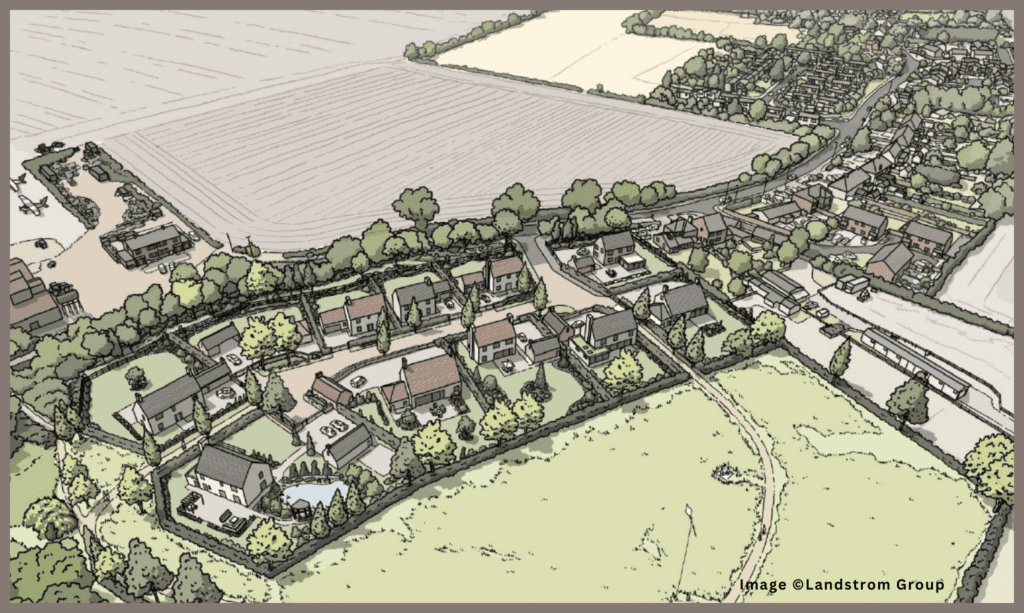Navigating Self-Build Planning Permission: The Role of Planning Consultants and the Impact of the Self-Build Act
2025 marks ten years since the introduction of the Self-build and Custom Housebuilding Act 2015 in England, a transformative piece of legislation that has empowered individuals to design and build their own homes. At SF Planning, we have extensive experience guiding clients through the complexities of securing planning permission for self-build projects. Our expertise in navigating national and local planning policies ensures that our clients’ visions become reality. This article explores the benefits of engaging a planning consultant, the role of national planning policy, the purpose and evolution of the Self-Build Act, and a case study demonstrating how we successfully overturned a council’s refusal at appeal by challenging manipulated data.
The purpose of the Self-Build Act
The Self-build and Custom Housebuilding Act 2015 was introduced to address the limited opportunities for individuals to build their own homes in England. Self-build housing allows people to create bespoke, high-quality homes tailored to their needs, often at a lower cost than purchasing developer-built properties. The Act aimed to:
- Boost housing supply by diversifying the housing market.
- Promote innovative and sustainable design.
- Support local economies by encouraging community-focused development.
The legislation placed two key duties on local planning authorities:
- Maintain a Self and Custom Build (SCB) Register to record individuals and groups seeking serviced plots for self-build or custom housebuilding.
- Grant sufficient planning permissions to meet the demand recorded on the SCB Register within three-year rolling periods.
By formalising these requirements, the Act sought to remove barriers such as restrictive planning policies and limited access to suitable land, making self-build a viable option for more people.
Evolution of the Self-Build Act Since 2015
Over the past decade, the government has implemented several amendments to the Self-Build Act in order to strengthen its impact:
- 2016 Regulations: The Self-build and Custom Housebuilding Regulations 2016 clarified eligibility criteria for the SCB Register, introducing a local connection test to prioritise applicants with ties to the area and requiring evidence of financial capability to ensure viable projects.
- Strengthened Monitoring: Local authorities are now required to publish annual monitoring reports detailing demand on their SCB Register and the number of permissions granted for self-build plots. This transparency aims to hold councils accountable for meeting demand.
- Community Infrastructure Levy (CIL) Exemptions: Self-build projects are eligible for CIL exemptions, provided applicants submit Part 1 and Part 2 forms to demonstrate that the development is genuinely self-build. This has incentivised self-build development but also highlighted the need for robust verification processes.
- Biodiversity Net Gain (BNG) Exemptions: Small scale self-build projects are also exempt from the statutory duty requirement to deliver 10% BNG.
Despite these advancements, challenges remain. Some local authorities have been criticised for inaccurately reporting self-build permissions, either by including non-self-build schemes or failing to verify whether permissions result in genuine self-build homes. This underscores the importance of expert planning consultancy to challenge such discrepancies.
The Role of National Planning Policy
The National Planning Policy Framework (NPPF), updated in 2024, plays a critical role in supporting self-build development. Key provisions include:
- Paragraph 110: Encourages developments that maximise sustainable transport solutions, offering genuine choices such as walking or cycling, particularly in rural areas where opportunities differ from urban settings.
- Paragraph 58: Emphasises the importance of planning obligations (e.g., Section 106 agreements) being necessary, directly related to the development, and proportionate in scale, ensuring contributions like education or infrastructure funding are justified.
- Paragraph 63: Confirms that the needs of different groups, including those who want to build or commission their own homes should be planned for.
- Paragraph 73: Recognises that small and medium sized sites can make an important contribution to meeting the housing requirement of an area, and are often built-out relatively quickly. It also requires LPAs to seek opportunities, through policies and decisions, to support small sites to come forward for community-led development for housing and self-build and custom-build housing.
- Support for Self-Build: The NPPF encourages local authorities to support self-build and custom housebuilding, aligning with the Self-Build Act’s objectives by promoting diverse housing delivery methods.
Local planning policies often set out specific criteria for self-build developments. However, navigating these policies requires a deep understanding of both national and local frameworks, which is where planning consultants excel.
Benefits of Using a Planning Consultant
Engaging a planning consultant like SF Planning offers significant advantages for self-builders:
- Expert Navigation of Planning Policies: Consultants have in-depth knowledge of the NPPF and local plans, ensuring applications align with relevant policies.
- Robust Evidence Gathering: Consultants can scrutinise local authority data, such as SCB Register figures, to challenge inaccuracies or manipulations that may lead to unjustified refusals.
- Appeal Expertise: If an application is refused, consultants can prepare compelling appeal cases, leveraging legal and policy arguments to overturn decisions.
- Section 106 Agreements: Consultants ensure that planning obligations, such as contributions for education or infrastructure, are fair and compliant and their wording secures the development as self/custom build to ensure the development can benefit from CIL & BNG exemptions.
- Time and Cost Efficiency: By anticipating potential issues and preparing thorough applications, consultants reduce the risk of delays or costly revisions.
Without professional support, self-builders may struggle to interpret complex policies, meet procedural requirements, or challenge council decisions, potentially jeopardising their projects.
Case Study: Successful Appeal at Piddington
A recent project by SF Planning highlights the value of expert consultancy in securing self-build planning permission. In 2023, we submitted an outline planning application for 11 serviced self-build plots and public open space on land east of Forest Road, Piddington, Northamptonshire. West Northamptonshire Council refused the application for the site, located just outside the village confines, on two grounds:
- The site’s location in open countryside, which the council deemed unsustainable due to limited public transport and reliance on private vehicles, contrary to LPP1 Policies S1 and R1.
- The absence of a completed Section 106 agreement to secure self-build delivery and developer contributions, failing to comply with LPP2 Policies LH1 and LH5 and LPP1 Policy INF2.
The Appeal
SF Planning appealed the decision, and the Planning Inspectorate heard the case on 12 February 2025 via a hearing. Our team meticulously challenged the council’s reasoning, particularly their claim that they had met self-build demand in the borough (a change in stance following the determination of the application). The council’s Self and Custom Build Annual Monitoring Report 2024 reported sufficient permissions to meet demand, but we identified significant discrepancies:
- The council’s figures differed by 99 from those submitted to the Ministry for Housing, Communities and Local Government (MHCLG), casting doubt on their accuracy.
- Many permissions counted as self-build lacked Part 2 CIL exemption forms, suggesting they were not genuine self-build schemes. For example, some permissions involved developments unlikely to be self-build, such as replacing mobile homes with log cabins for equestrian workers.
- Other permissions were outdated, amended, or advertised for sale, which further undermined the council’s claim.
By interrogating these figures and referencing prior appeal decisions, we argued that the council had overstated self-build permissions, failing to meet the demand on their SCB Register as required by the Self-Build Act. We also demonstrated that the site was sustainable, with accessible services in nearby Hackleton reachable by foot or cycle, aligning with NPPF Paragraph 110. Additionally, a signed Section 106 agreement dated 20 February 2025 addressed the council’s second concern by securing self-build delivery and contributions for education and recycling.
The Decision
On 7 March 2025, the Planning Inspector allowed the appeal, granting permission subject to conditions ensuring sustainable drainage, highway safety, and biodiversity enhancements. The Inspector concluded that the proposal complied with LPP2 Policies LH1 and LH5 by meeting self-build demand and was a suitable location despite its countryside setting, overriding LPP1 Policy R1 due to the specific self-build exceptions in the more recent local plan.
This case underscores how SF Planning’s expertise in analysing data, formulating robust arguments, and navigating appeals can overturn refusals, delivering successful outcomes for our clients. Read more about this appeal on our website.
Conclusion
The Self-build and Custom Housebuilding Act 2015 has undoubtedly created opportunities for self-builders but securing planning permission remains a complex process. National planning policies, such as those in the NPPF, support sustainable self-build development, while local policies can provide specific pathways for approval.
However, local authorities may misinterpret or manipulate data to justify refusals, as seen in the Piddington case. Engaging a planning consultant like SF Planning ensures that applications are robust, policies are correctly applied, and challenges are effectively addressed at application stage and, if necessary, at appeal. If you’re considering a self-build project and need help with navigating self-build planning permission, contact SF Planning to turn your vision into reality with confidence.
Get in Touch
SF Planning provides frank and responsible advice and assistance on a variety of planning matters. Get in touch to see how we can help with your project.
e: info@sfplanning.co.uk
t: Cheltenham: 01242 231575 | Gloucester: 01452 527997 | London: 020 3763 8005
SF Planning – What we do


